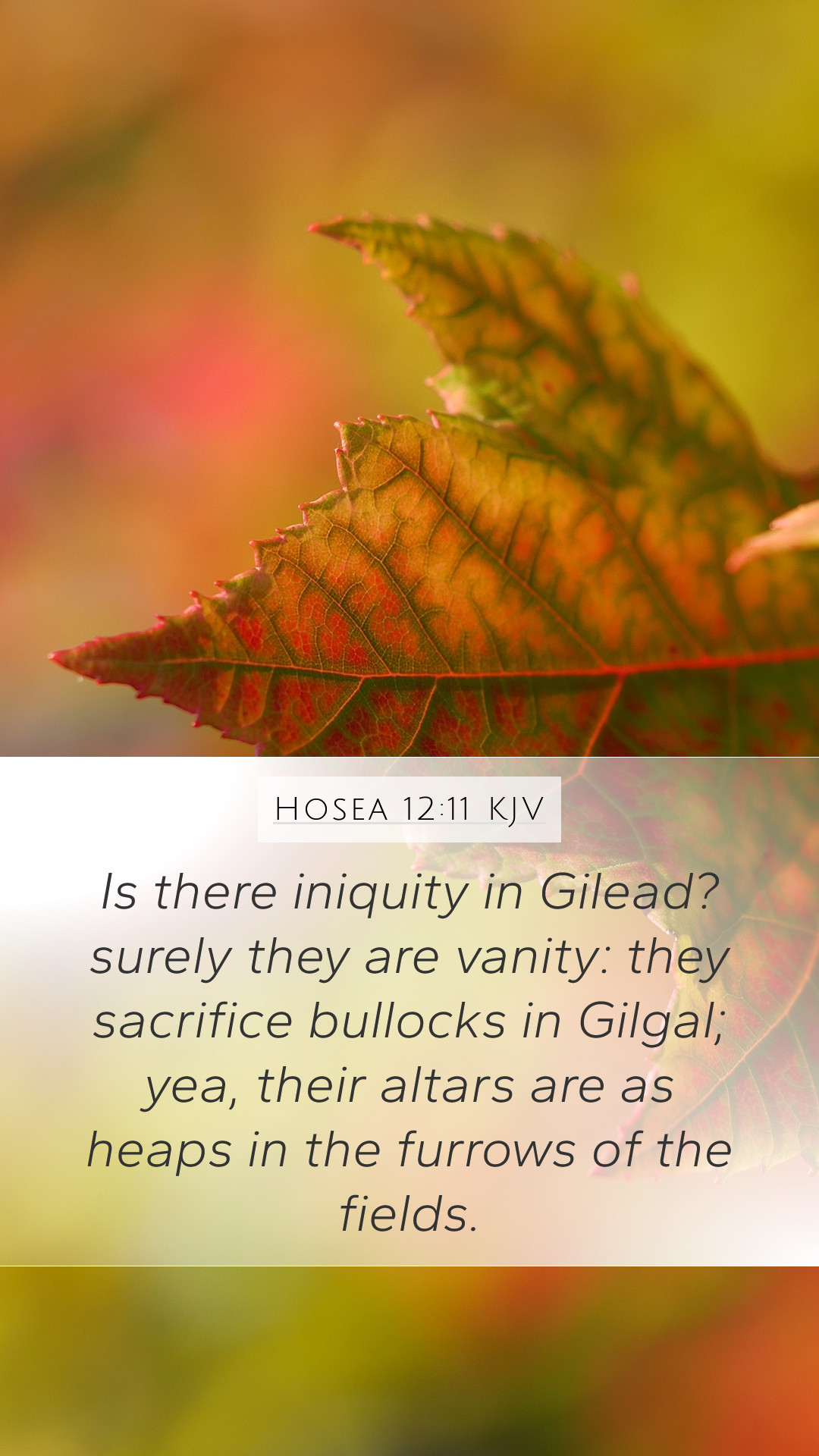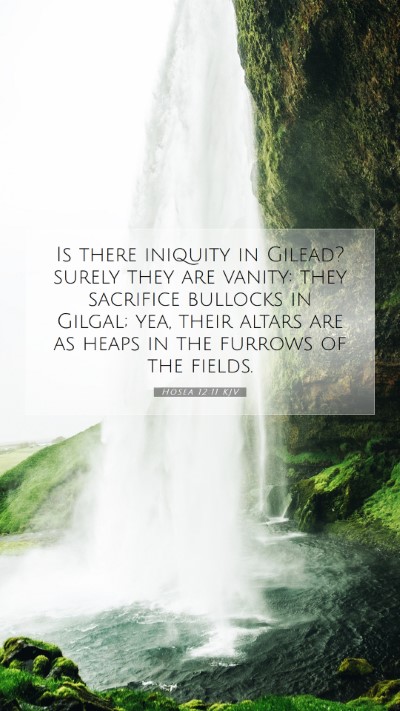Old Testament
Genesis Exodus Leviticus Numbers Deuteronomy Joshua Judges Ruth 1 Samuel 2 Samuel 1 Kings 2 Kings 1 Chronicles 2 Chronicles Ezra Nehemiah Esther Job Psalms Proverbs Ecclesiastes Song of Solomon Isaiah Jeremiah Lamentations Ezekiel Daniel Hosea Joel Amos Obadiah Jonah Micah Nahum Habakkuk Zephaniah Haggai Zechariah MalachiHosea 12:11 Meaning
What is the meaning of Hosea 12:11?
Is there iniquity in Gilead? surely they are vanity: they sacrifice bullocks in Gilgal; yea, their altars are as heaps in the furrows of the fields.
Hosea 12:11 Bible Verse Meaning
Bible Verse Meaning: Hosea 12:11
Hosea 12:11 states: "If Gilead is to be considered worthless, they will come to nothing; in Gilgal, they sacrifice bulls. Their altars will be like stone heaps on the furrows of a field." This verse encapsulates the themes of Israel's idolatries and God's judgment against them, portraying the futility of their sacrifices when not offered in true worship.
Understanding Scripture: Insights from Public Domain Commentaries
Matthew Henry's Commentary
Matthew Henry notes that this verse addresses the hypocrisy of Israel's sacrifices. He reflects on how Gilead and Gilgal, which were once significant locations for worship and sacrifice, have become associated with hollow ritualistic worship devoid of true reverence for God. Henry emphasizes that mere external acts of worship do not satisfy God when the heart is not aligned with Him.
Albert Barnes' Notes
Albert Barnes expounds on the implications of the word "worthless." He elaborates that the sacrifices offered in Gilgal, which might have been intended for God, are ultimately rendered useless due to the sinfulness of the people. Barnes points out that their altars will be "like stone heaps," devoid of any divine significance. He stresses the crucial understanding that God desires authentic devotion rather than ritualistic compliance.
Adam Clarke's Commentary
Adam Clarke focuses on the historical context of the verse, explaining that Gilead was a region known for its wealth and fertility, yet it became a symbol of spiritual barrenness due to Israel's unfaithfulness. Clarke stresses that the imagery of "stone heaps" suggests a desolate state, which symbolizes the futility of their idolatrous practices and the eventual divine judgment they would face as a result.
Key Themes and Interpretations
- Hypocrisy in Worship: The verse demonstrates how Israel's outward worship fails to align with a genuine heart toward God.
- Divine Judgment: There is a strong emphasis on accountability and the consequences of turning away from true worship.
- Spiritual Barrenness: The reference to "stone heaps" conveys the emptiness of ritualistic religion when not rooted in authentic faith.
Bible Verse Commentary: Relevance and Application
This verse offers insights into the nature of genuine worship and the importance of an earnest heart in presenting sacrifices to God. It is a call for self-examination, prompting believers to reflect on their own worship practices and ensure they align with God's desires.
Biblical Exegesis: Cross References
- Amos 5:21-24: God rejects insincere worship that lacks justice and righteousness.
- Micah 6:6-8: Highlights what God truly requires from His people—justice, mercy, and humility.
- Isaiah 1:11-15: God expresses disdain for rituals devoid of sincerity and justice.
Conclusion: Understanding Bible Verse Meanings
Hosea 12:11 serves as a powerful reminder of the necessity for true devotion in worship. By examining deeper meanings from public domain commentaries, believers can gain profound Bible study insights and enrich their understanding of Scripture. The verse calls individuals to engage actively in their spiritual lives, ensuring that their actions and hearts align with God's will.
Study Applications
For those engaging in bible study groups or online bible study, Hosea 12:11 can foster discussions about the relevance of inner transformation over external rituals. Explore additional bible study insights regarding the implications of true worship and the nature of God’s judgment.


